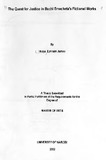| dc.description.abstract | In this thesis, we investigate Buchi Emecheta's treatment of the quest for justice in four
of her fictional works, namely: The Joys of Motherhood, Kehinde, Destination Biafra
and Gwendo/en. We scrutinize how the writer handles the subject of motherhood and
leadership as a way of determining her view of justice as it relates to women and men.
We set out to study how her experiences in the African diaspora influence her quest.
Further, we explore the author's vision of women's advancement.
In our investigation, we establish that motherhood and how it is regarded in the
societies under scrutiny is an obstacle to the quest for justice by women. It hinders or
limits the nature of choices they make. Placing motherhood on a sacrosanct pedestal,
even as it becomes a tool of oppression, diminishes the quest for justice as it restricts
the socio-economic and political horizons of women. This negative outcome also
negates the moral stature of men, as they appear intent on maintaining the status quo
of oppression (of women) at all levels of community life.
Patriarchy is therefore identified as a hindrance to the struggle for, and maintenance of,
justice. It engenders an environment in which men engage in mutual duplicity and
corruption. This leads to the failure of leadership. The diaspora experience enables the
author to see the problems faced by black women and their struggle for justice in
perspective. However, Buchi Emecheta presents untenable situations in which only
those women characters that go to London achieve some sense of personal fulfilment.
This, we aver, poses problems to the establishment of situations in which the rights of
both women and men are upheld right within Africa and African societies.
We further ascertain that black male characters whether in Africa or the African
diaspora, are mostly portrayed as perpetrators of injustice against women and the
society at large. They are treated as weak and dispensable caricatures. Conscious
attempts are made to portray women characters positively at all times. However, these
fail, as the women are stereotypes of individuals who are socially, politically and
economically subjugated. They are incapable of achieving self-esteem and a sense of
justice. Consequently, the pursuit for justice is equivocal as the affirmation of the
principle in the key characters is either missing or incomplete. There is no synthesised
vision of women's advancement or of justice. | en |

